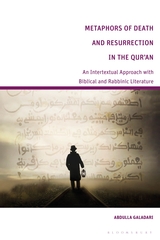Galadari (Abdulla), About Metaphors of Death and Resurrection in the Qur’an. An Intertextual Approach with Biblical and Rabbinic Literature, NYC, Bloomsbury Academic, 2021, 288 p. ISBN 978-1350244528
Auteur
Abdulla Galadari is an Assistant Professor at Khalifa University of Science & Technology, United Arab Emirates.
Abdulla’s research focuses on Qur’anic studies and hermeneutics, especially in the intertextuality between the Qur’an and Biblical literature, as well as comparative theology, comparative religion, and the intersection between science and religion. His research is interdisciplinary in nature, often combining science, such as neuropsychology, linguistics, and religious studies.
Presentation
Through extensive textual analysis, this book reveals how many passages of the Qur’an define death and resurrection spiritually or metaphorically.

While the Day of Resurrection is a major theme of the Qur’an, resurrection has largely been interpreted as physical, which is defined as bones leaving their graves. However, this book shows how the Qur’an alludes to death and resurrection in a very metaphoric manner – for example, rebuilding a desolate town, typically identified as Jerusalem, and bringing the Israelite exiles back. At other times, the Qur’an speaks of non-believers as spiritually dead, those who live in this world, but are otherwise zombies.
The author presents an innovative theory of interpretation, contextualizing the Qur’an within Late Antiquity and traces the Qur’anic passages back to their Biblical, extra-biblical, and rabbinic subtexts and traditions
Table des matières
Introduction
1. Concepts of the Afterlife
2. Terminologies of Life
3. Terminologies of Death
4. Death
5. Life
6. The Vivid Portrayal of Physical Resurrection in Qur’an 2:259
7. The Portrayal of Physical Resurrection in Qur’an 2:260
8. The Metaphor of Physical Resurrections
9. The Red Cow and Bringing Back the Dead
Conclusion : Death and Resurrection in the Qur’an
Bibliography
Index
(Credit Photo : Haydan As-soendawy)
